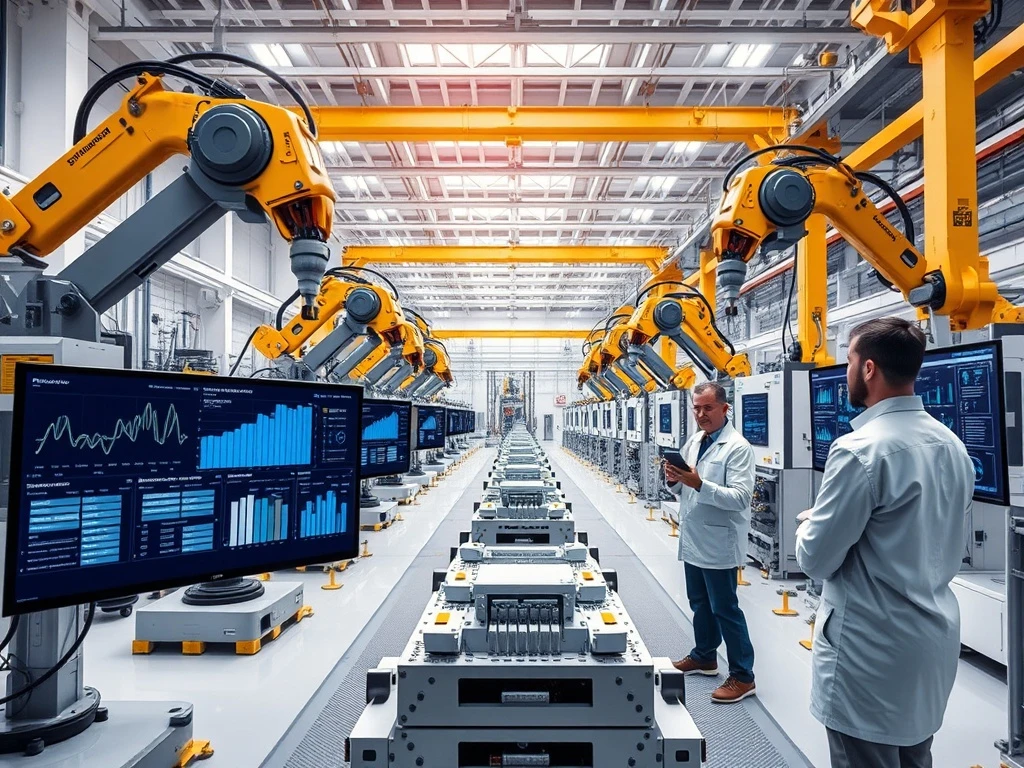Manufacturing facilities worldwide are undergoing a radical transformation through data science manufacturing integration. This revolution creates smarter factories that optimize every production aspect. Consequently, businesses achieve unprecedented efficiency levels and competitive advantages.
The Foundation of Data Science in Manufacturing
Data science manufacturing begins with comprehensive data collection. Modern factories deploy thousands of sensors across production lines. These sensors capture real-time information about equipment performance, product quality, and operational parameters. Subsequently, advanced algorithms process this data to extract valuable insights.
Manufacturers utilize several key technologies:
- IoT sensors for continuous monitoring
- Machine learning algorithms for pattern recognition
- Cloud computing platforms for data storage
- Real-time analytics dashboards for decision support
Predictive Maintenance Through Data Analytics
Data science manufacturing enables predictive maintenance strategies. Traditional maintenance schedules often cause unnecessary downtime or miss critical failures. However, data-driven approaches analyze equipment behavior patterns to predict failures before they occur. This proactive method significantly reduces unplanned downtime and maintenance costs.
Manufacturers report impressive results:
- 30-40% reduction in maintenance costs
- 45-55% decrease in equipment failures
- 25-35% extension in machinery lifespan
Quality Control Revolution
Data science manufacturing transforms quality assurance processes. Computer vision systems inspect products with superior accuracy compared to human inspectors. These systems analyze thousands of units per minute, identifying defects invisible to the human eye. Moreover, machine learning algorithms continuously improve detection capabilities through experience.
Quality improvements include:
- 99.9% defect detection accuracy
- Real-time production adjustments
- Automated root cause analysis
- Continuous process optimization
Supply Chain Optimization
Data science manufacturing extends beyond factory walls into supply chain management. Advanced analytics predict demand fluctuations with remarkable accuracy. Consequently, manufacturers optimize inventory levels and production schedules. This integration minimizes waste while ensuring timely product delivery.
Supply chain benefits encompass:
- 20-30% inventory reduction
- 15-25% improvement in delivery times
- Enhanced supplier performance monitoring
- Dynamic logistics optimization
Workforce Transformation and Skills Development
The data science manufacturing evolution creates new workforce requirements. Traditional manufacturing roles evolve into technology-focused positions. Employees now need data analysis skills alongside mechanical expertise. Therefore, companies invest heavily in training programs and digital literacy initiatives.
Key workforce changes include:
- Data analyst positions on factory floors
- AI-assisted decision making tools
- Augmented reality maintenance guides
- Continuous skills upgrade programs
Implementation Challenges and Solutions
Despite obvious benefits, data science manufacturing implementation faces several challenges. Many manufacturers struggle with legacy systems integration and data silos. Additionally, cybersecurity concerns require robust protection measures. However, progressive implementation strategies and partner ecosystems help overcome these obstacles.
Successful implementation strategies involve:
- Phased technology adoption
- Cross-functional implementation teams
- Comprehensive change management programs
- Strategic technology partnerships
Future Trends in Smart Manufacturing
Data science manufacturing continues evolving with emerging technologies. Artificial intelligence and digital twin technology represent the next frontier. These advancements will create fully autonomous factories capable of self-optimization. Furthermore, blockchain integration will enhance supply chain transparency and product traceability.
Emerging trends include:
- Autonomous robotic systems
- Generative design algorithms
- Edge computing for real-time processing
- Sustainable manufacturing analytics
The data science manufacturing revolution fundamentally reshapes industrial production. Smart factories leverage data-driven insights to achieve unprecedented efficiency, quality, and flexibility. As technology advances, manufacturers who embrace this transformation will lead global industrial competitiveness.
Frequently Asked Questions
What is data science in manufacturing?
Data science in manufacturing involves using advanced analytics, machine learning, and artificial intelligence to optimize production processes, improve quality control, and enhance operational efficiency throughout manufacturing operations.
How does data science improve manufacturing quality?
Data science enables real-time quality monitoring through computer vision systems and predictive analytics. It identifies patterns leading to defects and automatically adjusts processes to maintain consistent product quality.
What are the main benefits of smart factories?
Smart factories achieve significant cost reductions, improved product quality, enhanced operational efficiency, reduced downtime, better supply chain management, and increased overall equipment effectiveness.
How much does implementing data science in manufacturing cost?
Implementation costs vary widely based on factory size and existing infrastructure. However, most manufacturers achieve return on investment within 12-24 months through efficiency gains and cost reductions.
What skills are needed for data science in manufacturing?
Required skills include data analysis, machine learning, IoT implementation, statistical process control, and domain-specific manufacturing knowledge alongside traditional engineering expertise.
Can small manufacturers implement data science solutions?
Yes, cloud-based solutions and modular platforms now make data science accessible to manufacturers of all sizes. Many providers offer scalable solutions that grow with business needs.








